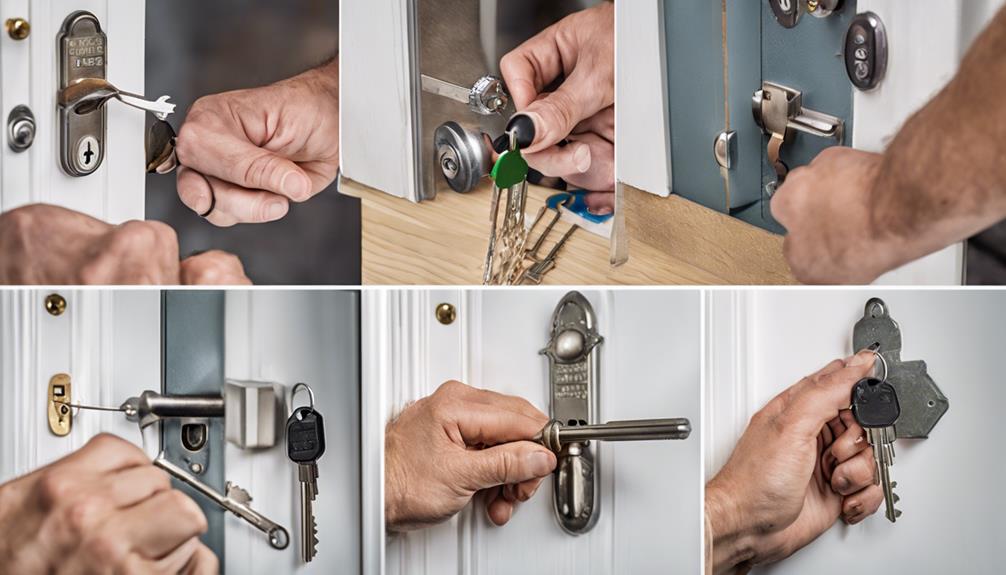When you're deciding between rekeying, lock replacement, and master keying, it's essential to weigh their costs and benefits. Rekeying usually costs $15 to $50 per lock and offers a budget-friendly option, ideal for enhancing security without breaking the bank. Lock replacement is pricier, ranging from $20 to $500, depending on the lock type and installation. Master keying comes with higher initial costs for convenience but pays off in the long run with easier access management. Choosing the right solution can boost your property's security and convenience based on your specific needs. You'll find additional details that can help you make a choice.
Key Takeaways
- Rekeying typically costs between $15 to $50 per lock, making it a budget-friendly option for enhancing security.
- Lock replacement costs range widely from $20 for basic locks to $500 for high-security options, plus installation fees.
- Master keying involves higher initial costs due to rekeying multiple locks but provides long-term access convenience with a single key.
- Rekeying is ideal for managing security on a budget, while replacement is necessary for improved security in damaged locks.
- Evaluating current lock conditions and future needs is essential for determining the most cost-effective security solution.
Overview of Lock Options
When it comes to lock options, there are numerous choices available to suit various needs and preferences. You'll find that understanding these options is essential for making informed decisions that best serve your interests and those of others. Among the most common choices are rekeying and lock replacement.
Re-keying vs. lock replacement is a vital consideration when determining the best approach for your specific situation.
Rekeying involves adjusting the internal pins of your existing lock, allowing a new key to operate it while rendering old keys useless. This option is often more cost-effective compared to replacement, making it a popular choice for those looking to control expenses.
In a cost comparison of rekeying vs. replacement, you'll notice that rekeying typically requires less labor and materials, which can save you money.
On the other hand, lock replacement means removing the entire locking mechanism and installing a new one. This option may be necessary if your locks are damaged, outdated, or if you desire enhanced security features.
While it's generally pricier, it can offer a fresh start with improved reliability. Ultimately, your choice should align with your specific needs, ensuring you provide the best possible security solutions for yourself and those you serve.
Cost of Re-keying
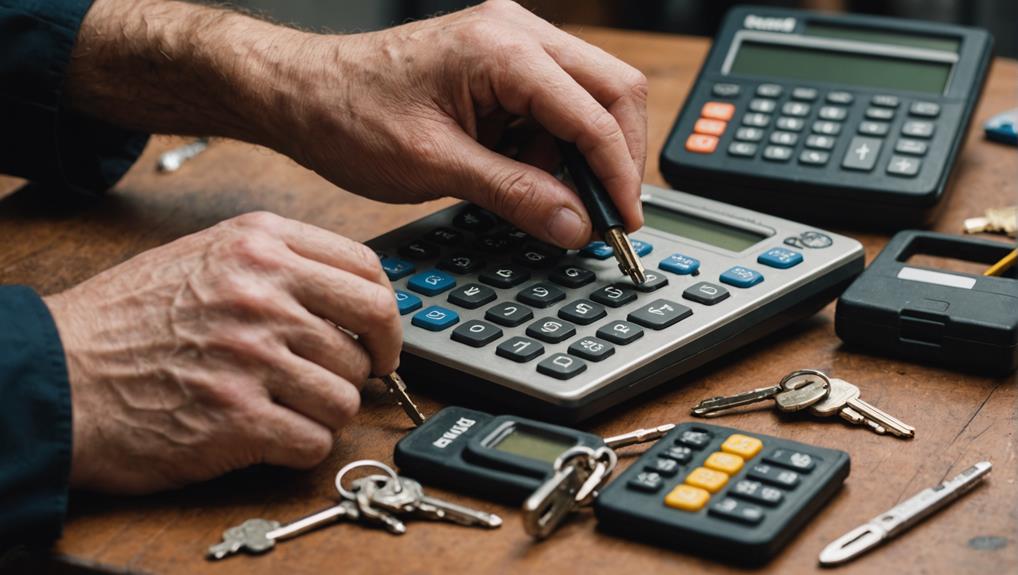
Rekeying offers a practical solution for those looking to enhance security without breaking the bank. It's a process that not only helps to improve your property's safety but also allows you to avoid the hassle of replacing locks entirely.
When you consider the cost of re-keying, you'll find it's often considerably lower than replacing an entire lock. Typically, you can expect to spend anywhere from $15 to $50 per lock, depending on the complexity and the service provider. This makes rekeying an appealing option for homeowners and businesses alike, especially if budget constraints are a concern.
Additionally, re-keying can provide the security and cost-saving benefits that many property owners seek.
By rekeying, you're not only saving money but also gaining peace of mind. Imagine being able to control who's access to your property without the hefty price tag associated with lock replacement.
Moreover, if you're managing multiple properties or rentals, rekeying allows you to easily adapt to changing tenant needs without incurring substantial costs.
In addition, many locksmiths offer mobile services, which can save you time and additional expenses.
Ultimately, the cost of re-keying is a small investment for the security and convenience it provides. You're taking a proactive step to protect your space, ensuring that only authorized individuals can enter.
Cost of Lock Replacement
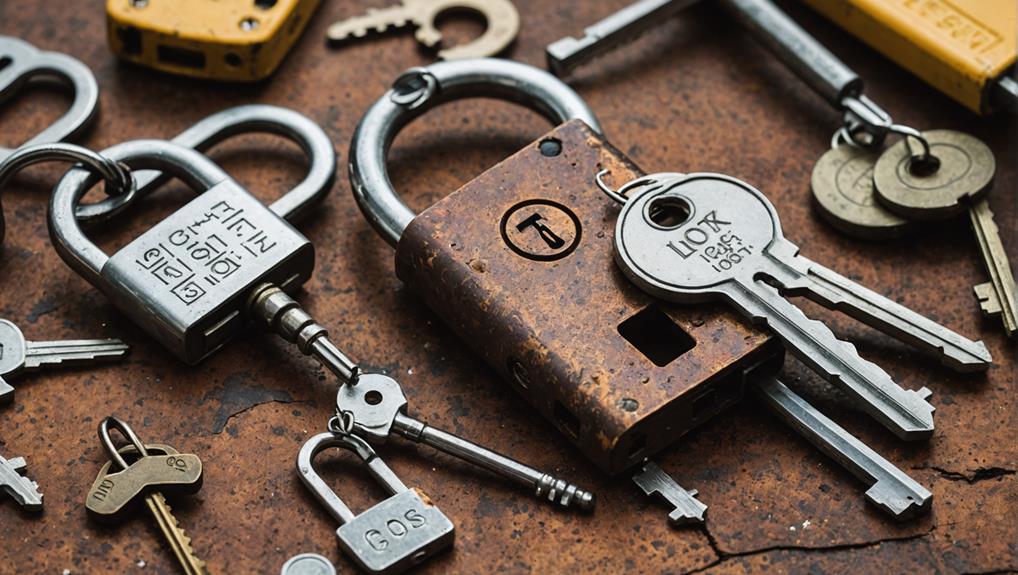
Considering the need for enhanced security, lock replacement can be a necessary investment for many property owners. When you think about the safety of your space, understanding lock replacement costs helps you make informed decisions. The price can vary based on several factors, including the type of lock and labor involved. Here's a breakdown to guide you:
| Lock Type | Average Cost (Material) | Labor Cost (Installation) |
|---|---|---|
| Basic Deadbolt | $20 – $50 | $50 – $100 |
| Smart Lock | $100 – $300 | $75 – $150 |
| High-Security Lock | $100 – $500 | $75 – $150 |
These costs can add up, but investing in a reliable lock system greatly enhances your property's security. You'll not only protect your belongings, but you'll also provide peace of mind for those using the space. Ultimately, weighing the benefits of lock replacement against its costs can lead to a safer environment for everyone involved.
Cost of Master Keying
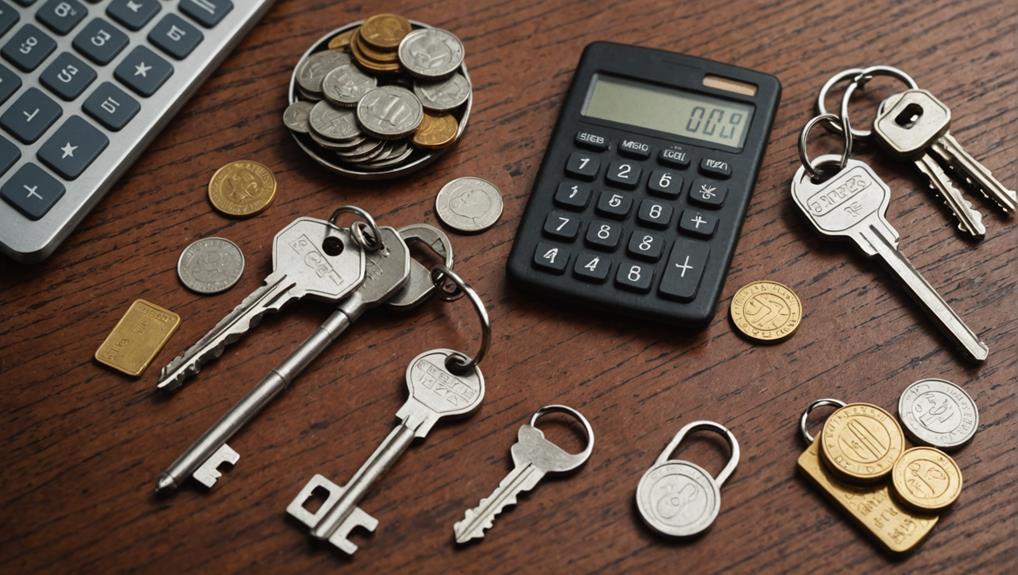
If you're looking to streamline access while maintaining security, master keying can be a valuable option. This system allows you to use one key to access multiple locks, making it easier for staff to perform their duties without compromising safety.
In environments like multi-unit and commercial properties, situations where master keying excels become increasingly evident. However, understanding the cost of master keying is essential for effective budgeting.
The cost of master keying typically includes the initial setup, which involves rekeying existing locks and creating a master key. Depending on the number of locks and the complexity of your system, these expenses can vary.
Generally, you'll find that the initial investment is higher than re-keying but offers long-term benefits in convenience and security management.
Additionally, consider the cost of maintenance and potential future modifications. As your organization grows, you may need to add more locks or change access levels, which can incur additional costs.
Ultimately, while the upfront cost of master keying may be significant, the efficiency and control it provides can greatly enhance your ability to serve others effectively.
Balancing initial expenses with ongoing benefits will guide you in making the right decision for your security needs.
Comparison Summary
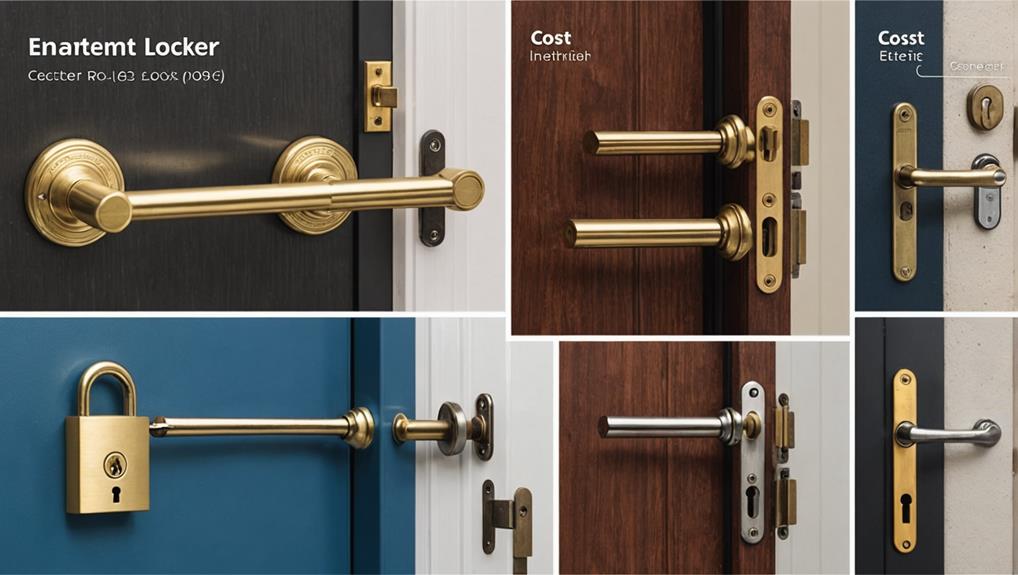
When evaluating different lock solutions, your organization's needs play a pivotal role in determining the best fit. Understanding the rekeying vs. master keying price can help you make an informed decision that aligns with your mission to serve others effectively.
It's important to contemplate factors such as the potential for future security upgrades and the current state of your locks, as comprehensive comparisons of re-keying and lock replacement can reveal significant insights.
Here's a summary to guide your choice:
- Rekeying: This option is typically more cost-effective, allowing you to maintain security without the expense of replacing locks. It's ideal for organizations on a tight budget but still needing reliable access control.
- Lock Replacement: While this can offer upgraded security, it involves higher costs and may disrupt operations. Consider this if your locks are outdated or compromised.
- Master Keying: This provides convenience by allowing designated personnel access to multiple locks with a single key. The initial investment might be higher, but it optimizes efficiency and streamlines operations.
Ultimately, weigh the rekeying vs. master keying price alongside your organization's specific needs. Each solution has unique benefits, and selecting the right one will enhance security while supporting your commitment to serving your community.
Frequently Asked Questions
How Long Does the Re-Keying Process Typically Take?
Re-keying a lock typically takes about 15 to 30 minutes, depending on the complexity of the lock and your technician's experience.
You'll appreciate how quick and efficient the process can be, ensuring your security needs are met without a lengthy wait.
Once the technician arrives, they'll assess the lock and make the necessary adjustments, leaving you with a new key that operates seamlessly with your existing lock system.
What Tools Are Needed for Lock Replacement?
For lock replacement, you'll need a few essential tools.
Grab a screwdriver, usually a flathead or Phillips, to remove the old lock. A drill might come in handy if you need to create new holes.
Don't forget a measuring tape to guarantee the new lock fits properly.
Finally, a utility knife can help with any adjustments.
With these tools, you can efficiently replace locks and enhance security for those you serve.
Can I Re-Key a Lock Myself?
Yes, you can re-key a lock yourself if you have the right tools and a bit of patience.
You'll need a re-keying kit, which usually includes new pins and a key. Follow the instructions carefully, and make sure to practice safety.
It's a rewarding task that can save you money and give you a sense of accomplishment. Plus, you'll enhance your skills while ensuring your home stays secure.
What Are the Security Benefits of Master Keying?
Master keying offers you enhanced control and convenience.
With a master key system, you can access multiple locks using one key, simplifying your routine. It also improves security by limiting access; only authorized individuals hold the master key, reducing the risk of unauthorized entry.
You'll appreciate the flexibility it provides, allowing you to tailor access levels for different areas while maintaining a secure environment for those you serve.
It's an efficient solution for managing security.
How Often Should Locks Be Replaced or Re-Keyed?
Did you know that 1 in 4 homes will experience a break-in?
To enhance security, you should consider replacing or re-keying your locks every 3 to 5 years. This not only guarantees your safety but also helps protect those you care about.
Regular assessments of your locks' condition can prevent vulnerabilities. Stay proactive, and don't hesitate to take action when you notice wear or if you've recently moved to a new place.
Conclusion
In the end, you might think replacing a lock is the most secure option, but re-keying can often be the smarter, more cost-effective choice. After all, why spend more money when a simple tweak can keep your space just as safe? And then there's master keying—perfect for those who love juggling keys like a circus act. So, when it comes to locks, remember: sometimes the simplest solution is hiding in plain sight, waiting for you to discover it.

